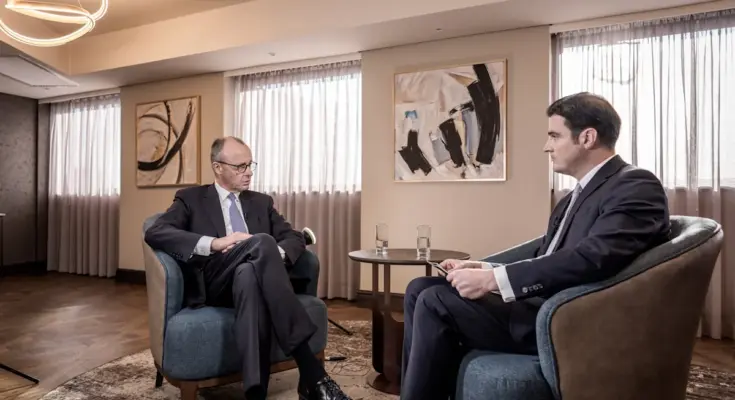In an interview with WELT, Chancellor Friedrich Merz gave an overview of how he wants to change the Ukraine peace plan promoted by America and Russia. Merz strongly supports Ukraine – but does not want to lose the United States as NATO leader.
The G-20 met for consultations in Johannesburg, South Africa, but without the United States, China, Russia and Saudi Arabia. Chancellor Merz was there to answer questions.
WORLD: Mr. Chancellor, one of the topics at the G-20 Summit was Russia’s war of aggression against Ukraine. The US and Russia had drawn up a 28-point plan, but it was rejected by European countries because it envisioned handing over significant territory from Ukraine to Russia. Ukraine must reduce its armed forces significantly. How much hope do you have of blocking Trump? You also talked to him for a long time on the phone.
Friedrich Merz: Ukraine did not play a role as an issue at this summit. The South African government planned and executed the summit differently. We had a series of discussions at the same time. Negotiations are now underway in Geneva. Our representatives sat together in Geneva and conducted difficult negotiations, the outcome of which is still uncertain.
WORLD: And do you plan on meeting in person with President Trump in the near future to discuss things?
Merz: First of all, we spoke for a long time on the phone on Friday and we were also in close contact with each other through our teams. This is a discussion that is now truly in depth and we will have to wait and see the outcome.
WORLD: Regarding the 28-point plan, President Zelensky said that Ukraine now has a choice between losing its dignity or losing its most important main partner. Can you understand the desperation Zelensky expressed?
Merz: I can understand the desperation of the entire country because this war has been going on for almost four years and that is why President Zelensky is very clear in his stance. He must not give up his country and we support him in this stance.
WORLD: They say they support it. You’ve said that you’ve given your own advice. For you personally, where is the red line that Ukraine should not accept?
Merz: Some of the 28 points are currently being negotiated in Geneva. The red line is of course the territorial integrity of Ukraine and also the right to exist of this country. This is not an issue here, and so far we support, and I personally also support, the Ukrainian government’s negotiation path.
WORLD: The US clearly developed this 28-point plan with Russia compared to European countries. Therefore, Atlantic Bridge chairman and former Minister of Foreign Affairs Sigmar Gabriel spoke of a betrayal of transatlantic relations. How much damage do you think this has done to transatlantic relations?
Merz: I’m very interested in America’s commitment and America’s commitment to their responsibilities within the NATO alliance. This is not just a war against Ukraine. This is a war against the entire community of Western nations, against the European political order. And the American people have as much interest in their own survival as the rest of us.
WORLD: In these negotiations there is now a lot of discussion regarding possible security guarantees that can be offered to Ukraine. What role specifically can Europe play? What can you offer Ukraine?
Merz: We discussed the possibility of security guarantees a few weeks ago in Washington. I am grateful that America has once again agreed to participate in security guarantees. This wouldn’t have worked without America. That’s why we are discussing this with the Americans, but now is not the right time to speculate on the specific form of this security guarantee.
WORLD: The German public is of course wondering what the impact will be on Germany. So the question is, do you think German ground forces can also secure the demilitarized zone?
Merz: This is all just speculation that actually has nothing to do with the current situation. We are now trying to end this war, at least reach a ceasefire. And if we can do that, then we have achieved a lot and the work will really begin.
WORLD: You are currently very involved in world politics. We also heard that you are looking to travel to Israel soon, perhaps in early December. Is that true? And if so, what goals do you associate with this trip?
Merz: I am currently involved in the ongoing summit and I will return to Berlin starting Tuesday morning and will then ensure that we pass the federal budget for 2026 and that we also complete the tasks that we have in terms of domestic policy. It also includes solutions to discussions regarding German pension insurance.
WORLD: Because you just mentioned it yourself: Are you sticking with the proposal that has passed the cabinet, or will there be changes?
Merz: The proposal will be decided by a vote in the Bundestag and we will carry out further discussions until then.
WORLD: Are you willing to combine this with the question of trust?
Merz: We conduct discussions in such a way that we achieve good joint results.



